Frank Barson
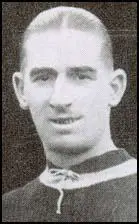
Frank Barson was born in Grimethorpe, Sheffield, on 10th April 1891. He worked as a blacksmith before joining Barnsley in 1911 and soon established himself in the club's first-team.
Barson's career was interrupted by the First World War. The Football League was suspended but in 1916-17 he played as a guest for Burnley.
After the war Barson had a disagreement with the Barnsley directors over the cost of his travelling expenses from his home in Sheffield. Unwilling to move closer to the club, Barson was sold to Aston Villa for a record fee of £2,850 in October 1919.
Barson was a great success at his new club. In their book, The Essential Aston Villa, Adam Ward and Jeremy Griffin argue that: "When Frank Barson arrived at Villa Park in the winter of 1919 he provided much-needed backbone to a team that was floundering hopelessly at the foot of Division One. Barson was a 1920s Stuart Pearce - feared for his biting tackles and competitive spirit, but admired for his ability on the ball." Barson developed a reputation for dirty play and was often booed and bated by opposing supporters.
In the 1919-20 season Aston Villa enjoyed a successful run in the FA Cup beating QPR (2-1), Manchester United (2-1), Sunderland (1-0), Tottenham Hotspur (1-0) and Chelsea (3-1). The club played Huddersfield Town in the final at Stamford Bridge. The referee, Jack Howcraft, entered the Villa dressing-room before the game and warned Barson that he would be sent off for any indiscretion. According to the authors of The Essential Aston Villa, "the normally unflappable Barson was taken aback and his performance was uncharacteristically cautious for much of the game." Billy Kirton got the only goal of the game and Villa won the cup for the sixth time in its history.
On 15th March, 1920, Barson won his first and only international cap for for England against Wales. England lost 2-1 and Barson was never recalled to the side. His reputation for dirty play probably was an important factor in this decision.
Barson refused to live in Birmingham, insisting that he should be allowed to travel from his home in Sheffield. This was a constant cause of conflict at the club and in August 1922 he was transferred to Manchester United for a fee of £5,000. During his time at Aston Villa he scored ten goals in 68 games.
Alex Murphy argues in The Official Illustrated History of Manchester United that: "The club had just been relegated, but they knew exactly what they wanted to revive their fortunes: a tough man to put some steel back into the side and inspire the men around him to win promotion. Barson was the right man. Just the fearsome sight of him was enough to demotivate some opponents: at 6 feet tall Barson loomed over most opponents and he had the sharp features and narrow, menacing eyes of an Aztec warrior."
As Garth Dykes, the author of The United Alphabet has pointed out: "Frank Barson was probably the most controversial footballer of his day. Barrel-chested and with a broken, twisted nose he was a giant amongst centre-halves. A blacksmith by trade, his one failing was that he hardly knew his own strength and was apt to be over impetuous. His desire to always be in the thick of the fray brought him into many conflicts with the game's authorities."
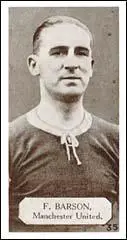
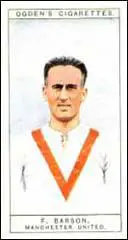
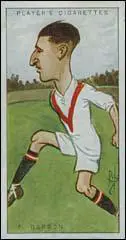
At the time Manchester United was in the Second Division of the Football League. Barson was promised a pub by the club chairman, John Henry Davies, if he managed to help the club win promotion to the First Division. This was achieved in the 1924-25 season and he was given his pub in Ardwick Green. However, as Tony Matthews points out in his book, Who's Who of Aston Villa: "Scores of punters turned up for the official opening. However, after after 15 minutes behind the bar, Barson, utterly fed up, handed the keys over to the head waiter and walked out, never to return."
On 27th March 1926, Manchester United played Manchester City in the semi-final of the FA Cup. During the game Sam Cowan was knocked unconscious. It was alleged after the game that Barson had punched Cowan in the face. An investigation by the Football Association resulted in Barson being suspended for eight weeks.
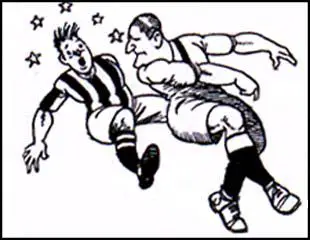
Barson was transferred to Watford in May 1928. Soon afterwards he was sent off in a game against Fulham. It was the 12th time in Barson's career and the Football Association decided to impose a seven-month ban on the player.
Barson became player/manager of Rhyl Athletic in June 1931. This was followed by jobs at Stourbridge (manager, July - August, 1935), Swansea Town (trainer, July 1947 - February, 1954) and Lye Town (trainer, September 1954 - April, 1956).
Frank Barson died in Winston Green, Birmingham on 13th September 1968.
Primary Sources
(1) Alex Murphy,The Official Illustrated History of Manchester United (2006)
The club had just been relegated, but they knew exactly what they wanted to revive their fortunes: a tough man to put some steel back into the side and inspire the men around him to win promotion. Barson was the right man. Just the fearsome sight of him was enough to demotivate some opponents: at 6 feet tall Barson loomed over most opponents and he had the sharp features and narrow, menacing eyes of an Aztec warrior.
(2) Garth Dykes, The United Alphabet (1994)
Frank Barson was probably the most controversial footballer of his day. Barrel-chested and with a broken, twisted nose he was a giant amongst centre-halves. A blacksmith by trade, his one failing was that he hardly knew his own strength and was apt to be over impetuous. His desire to always be in the thick of the fray brought him into many conflicts with the game's authorities.
(3) Tony Matthews, Who's Who of Aston Villa (2004)
Barson was promised a pub if he skippered Manchester United back to the First Division. He did just that and was given a hotel in Ardwick Green. Scores of punters turned up for the official opening. However, after after 15 minutes behind the bar, Barson, utterly fed up, handed the keys over to the head waiter and walked out, never to return.
